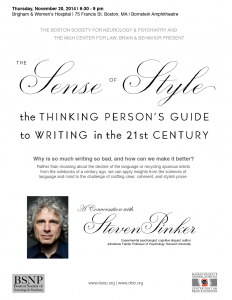On Thursday, November 20, 2014, at the Bornstein Amphitheater at Brigham and Women’s Hospital, CLBB and the Boston Society for Neurology and Psychiatry co-sponsored a talk by Steven Pinker, renowned Harvard cognitive psychologist, linguist, and popular author, to discuss his most recent book, The Sense of Style: The Thinking Person’s Guide to Writing in the 21st Century. Video of the event is included below in its entirety and at our Vimeo page.
Steven Pinker is an experimental psychologist and one of the world’s foremost writers on language, mind, and human nature. Currently Johnstone Family Professor of Psychology at Harvard University, Pinker has also taught at Stanford and MIT. He is widely published for his visual cognition and the psychology of language, and has been recognized for his research, teaching, and writing.
In his most recent entertaining and instructive book, Pinker rethinks the usage guide for the 21st century. Rather than moaning about the decline of the language, carping over pet peeves, or recycling spurious edicts from the rulebooks of a century ago, he applies insights from the sciences of language and mind to the challenge of crafting clear, coherent, and stylish prose. Pinker’s thesis should have myriad implications for writing at the translation of science to the general public, and neuroscience to law.
Pinker’s book has been reviewed widely, in The New York Times, the New Yorker, the Wall Street Journal, and Scientific American. His recently published pieces, “The Source of Bad Writing” in the Wall Street Journal, “Why Academics Stink at Writing” in the Chronicle of Higher Education, and “Passive Resistance: The active voice isn’t always the best choice” in The Atlantic.
In his talk, Pinker emphasized the importance of “classic” – conversational – style writing and lamented writers’ use of hallmarks like self-conscious apology, shudder quotes, and hedging to distance from or dilute a claim. These trends, plus the curse of knowledge, make up what Pinker calls academese. The academic writing which succeeds with a popular audience, Pinker says, transcends it authors’ self-consciousness and reaches the reader in a conversational way.
To watch video of the entire Pinker event, or explore past events on memory, free will, and empathy, see CLBB’s Vimeo channel.




